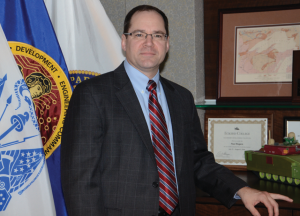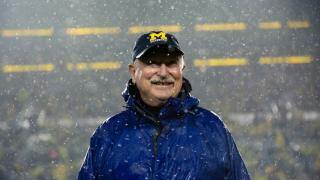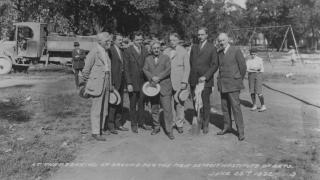

Engineering Center (TARDEC) in Warren. He is also a colonel in the Michigan National Guard and a veteran of Operation Iraqi Freedom. At TARDEC, Rogers is responsible for providing executive management and delivering advanced technology solutions for all Department of Defense ground vehicle systems (such as trucks and tanks) and combat support equipment.
Rogers’ military career was once just a young boy’s fantasy while growing up in Calumet—a village in Michigan’s Upper Peninsula.
“I come from a family that always thought highly of the military,” said Rogers, 48. “My father and uncle served in the Navy during World War II. Both of my grandfathers served in World War I. I think my upbringing definitely shaped my favorable view of the military.”
Instead of enlisting after high school, Rogers enrolled at Michigan Technological University in Houghton, where he earned a Bachelor of Science in mechanical engineering in 1988. He was the first in his family to earn a four-year college degree.
“I don’t know what took me into engineering,” Rogers said. “Michigan Tech was nearby, and I knew it had a strong engineering school. I was naturally drawn to this field—I wasn’t mentored by anyone or following in anyone’s footsteps.”
After graduating, Rogers joined the Michigan National Guard and spent two years working at a Michigan Tech research center. When his wife accepted a job at General Motors in Detroit, Rogers and his family moved downstate. He took a civilian position at TARDEC and eventually advanced to become its executive director for research and technology integration.
In the late 1990s, Rogers became interested in earning a master’s degree in mechanical engineering, thanks to an outreach program through the University of Michigan-Dearborn.
“TARDEC actively promotes higher education and encourages staff to seek advanced degrees,” Rogers said. “UM-Dearborn offered a couple of classes on the TARDEC campus. After enrolling, I had a very favorable impression of the professors and their commitment to their students. Because of that positive engagement, I continued taking evening classes at the Dearborn campus to complete my degree. At other schools, a student might just have access to a research assistant. But at UM-Dearborn, I had personal time with my professors. The university also has great standing in the academic and research worlds.”
As a master’s student, Rogers worked as a research assistant for associate professor of mechanical engineering Eric Ratts, who was developing electronic controls for automotive air conditioning systems.
“That experience helped enhance my academic rigor and discipline.” Rogers said. “I developed a strong work ethic that has carried through all of my endeavors.”
With a rekindled love for academic research, Rogers followed his interests by pursuing a doctorate in mechanical engineering-engineering mechanics from Michigan Tech while continuing his work at TARDEC.
After earning his Ph.D. in 2004, Rogers set aside his civilian career as the Michigan National Guard activated him to serve as battalion commander for the 507th Engineer Battalion in Iraq.
He led 823 service members from the Army, Air Force, Army National Guard, Army Reserve, and Marines. Some of his responsibilities included military fixed bridging, offensive assault float bridging, rafting operations, well drilling, and asphalt production and paving. He also organized, trained, and deployed an armored D9 dozer task force to support division offensive operations.
For these efforts, Rogers earned a Bronze Star, Army Meritorious Service Medal, Iraqi Campaign Medal, and other honors.
“I served for 14 months after being activated in November 2004,” Rogers said. “It’s always difficult to leave your family for that length of time. It was a stressful environment with a lot of risks. At the same time, I was surrounded by people who were very committed to their country and motivated to serve. It was a difficult experience, but one I’ll cherish for the rest of my life.”
After returning home, Rogers soon became involved in TARDEC program management projects. He advanced to deputy program executive officer for Ground Combat Systems. In this role, Rogers managed the development, testing, fielding, and improvement of ground combat systems such as the Abrams Tank, the Bradley Fighting Vehicle, and the Stryker family of vehicles.
In August 2012, Rogers became TARDEC director. Leveraging his military training, Rogers leads a workforce of more than 1,700 engineers, scientists, researchers, and support staff. He also manages an annual budget of more than $475 million and sets strategic direction for a full range of investments that affect more than 270 Army systems.
“Our job is to provide ground-based vehicle systems to American soldiers that allow them to do their jobs efficiently and bring them home safely,” Rogers said. “We provide the science and support for those platforms. We have a very dynamic workplace that maintains close partnerships with industry and academia. My day can be filled by meetings with those partners. We hope to partner with UM-Dearborn as well.
“The best part about working for TARDEC is the high level of passion our workforce maintains. I have the privilege of leading a very professional team that is committed to our mission. I don’t have a typical workday. On any given day, I might be meeting with our partners or dealing with armor protection, robotic systems, or corrosion challenges. That variety, coupled with our highly driven team, makes the work exciting.”
With his engineering knowledge and leadership experience, Rogers will continue striving to find ways to support American soldiers with innovative technology solutions.
“This is my dream job, and I’m making the most of it,” he said. “I’m really enjoying the opportunity to serve TARDEC and make positive contributions to our soldiers.”




